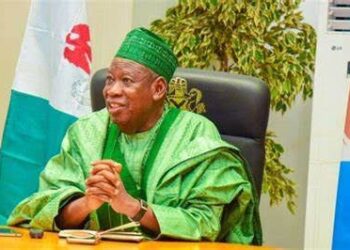One time US President, Barack Obama, in his famous book, The Audacity of Hope: Thoughts on Reclaiming the American Dream, said, “If you are walking down the right path and you are willing to keep walking, eventually you will make progress”. This cuts the picture of the President of the Nigerian Senate, Senator Godswill Obong Akpabio, whose penchant for hard work and hunger for achievements is unparalled. Wherever he finds himself in a leadership position, Akpabio always makes a mark and often wrought his uncommon leadership style to bear on the office. Of course, the uncommon leadership style is about people first, resilience, integrity, unwavering focus, good governance, uncanny patriotism and uncompromising national interest.
Having been popularly elected president of the senate on June 13, in one of the most hotly contested elections of presiding officers in the National Assembly, Akpabio hit the ground running and never left anyone in doubt as to his commitment to change the narrative in the conduct of legislative business. Armed with the uncommon belief, he has clearly etched his imprimatur on the paramount legislative house.
With just a little over five months as the president of the 10th Senate, Akpabio’s uncommon leadership effect is already being felt in the red chamber as there is a clear resolve to give Nigerians value for their votes and jettison the bandwagon legislative-executive unholy alliance. The era of the legislature pandering to the whims and caprices of the executive has been effectively put under checks with Akpabio as senate president.
Consequently, the naysayers who had tagged the 10th Senate as a rubber-stamped chamber are today singing praises of Akpabio because of the landmark resolutions taken by the upper legislative house in the past five months, which are clearly in favour of the common man and in tandem with the wishes and aspirations of Nigerians.
On July 25, 2023, the senate rejected a proposal from the executive to increase electricity tariff increment, arguing firmly in favour of Nigerians who have been finding it difficult to make ends meet due to petroleum subsidy removal. This earned the senate the sobriquet “Let Nigerians Breathe” because the 10th Senate under the guidance of Akpabio had insisted that poor Nigerians must be allowed to breathe and not made to face multiple economic battles. The resolution followed a motion co-sponsored by Senator Akintunde Yunus Abiodun (Oyo Central), Senator Asuquo Ekpenyong (Cross River South) and Senator Abbas, Aminu Iya (Adamawa Central).
Instead, the senate charged the executive to intervene and halt the proposed increase in electricity tariff by the Distribution Companies (Discos); urge Nigerian Electricity Regulatory Commission (NERC) to decentralise the proposed engagement with stakeholders scheduled for Abuja to the six geopolitical zones of the Federation for effective participation by all, also urge NERC to thoroughly look into the rate review applications filed by the Discos, taking into consideration the interests of citizens, affordability, and the need for improved service delivery.
On August 6, 2023, Akpabio’s uncommon politicking was also displayed in the Senate rejection of military action in Niger following the unconstitutional takeover of government by a military junta. President Bola Tinubu had sent a request to the senate on the need to send troops to Niger Republic to enforce the resolution of the Heads of States of the Economic Community of West African States for the junta that overthrew President Mohamed Bazoum to restore him to power or face military action. But having weighed the pros and cons of such an action, the senate led by Akpabio halted the move. Students of political history know the implication of such an intervention in Niger on Nigeria.
Again, on August 8, 2023, the Senate shocked not a few Nigerians when it turned down the nomination of three ministerial candidates: former FCT minister and immediate-past governor of Kaduna state, Mallam Nasir El-Rufai, former acting governor of Taraba state, Senator Sani Danladi, and Stella Okotete (Delta). For those who have followed Akpabio’s political trajectory, it was not surprising that these major stakeholders of the APC were stopped from being ministers. Everybody is aware of the significant role played by El-Rufai in the emergence of President Tinubu as the presidential candidate of the APC and his eventual victory at the general elections. Senator Danladi is a former senator and ordinarily should have enjoyed the parliamentary camaraderie of “bow and go”, but this did not apply under the Akpabio senate presidency, which has placed national interest above party affiliation and loyalty to the executive. This was indeed uncommon!
For the first time in the history of the senate since 1999, the upper chamber sat on Saturdays to perform their functions. The senate sat on Friday and Saturday; this is novel in the operations of the senate. Since 1999, only the House of Representatives had met outside the official allocated sitting days. But Akpabio, buoyed by the desire to reset the nation and change from the ‘business as usual’ way of doing things, deviated from the norm in order to screen ministerial nominees and handle other pressing matters of national importance.
Under Akpabio’s leadership, the Senate does not have ‘Keep in view’ in its operational dictionary as matters are attended to and discharged as they come. These are just a few instances of the uncommon transformation ongoing in the senate. This is the uncommon spirit to redefine governance and service delivery in the political arena. With the uncommon senator in the saddle, the Senate has regained its enviable in the annals of Nigeria’s legislature.
Dr. Tukur, a university don, writes from Abuja




